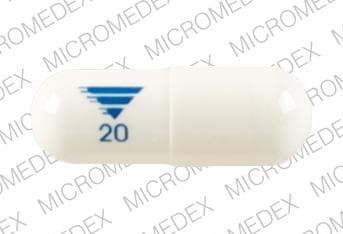What is Zegerid?
A prescription medicine called a proton pump inhibitor (PPI) used to reduce the amount of acid in your stomach.
- Zegerid for oral suspension and Zegerid capsules is used in adults for:
- up to 8 weeks for the healing of duodenal ulcers.
- up to 8 weeks for the healing of stomach ulcers.
- up to 4 weeks to treat heartburn and other symptoms that happen with gastroesophageal reflux disease (GERD).
- up to 8 weeks for the healing and symptom relief of acid-related damage to the lining of the esophagus (called erosive esophagitis or EE). Your doctor may prescribe another 4 weeks of Zegerid in patients whose EE does not heal.
- maintaining healing of EE and to help prevent the return of heartburn symptoms caused by GERD. It is not known if Zegerid is safe and effective when used for longer than 12 months for this purpose.
Zegerid for oral suspension is used:
- in critically ill adults to lower the risk of stomach bleeding (40 mg oral suspension only).
It is not known if Zegerid is safe and effective in children.
What is the most important information I should know about Zegerid?
Zegerid may help your acid-related symptoms, but you could still have serious stomach problems. Talk with your doctor.
Zegerid can cause serious side effects, including:
- A type of kidney problem (acute interstitial nephritis). Some people who take proton pump inhibitor (PPI) medicines, including Zegerid, may develop a kidney problem called acute interstitial nephritis that can happen at any time during treatment with Zegerid. Call your doctor right away if you have a decrease in the amount that you urinate or if you have blood in your urine.
- Zegerid contains sodium bicarbonate. Long-term use of bicarbonate with calcium or milk can cause a condition called “milk-alkali syndrome”. Long-term use of sodium bicarbonate can cause a condition called “systemic alkalosis”. Talk to your doctor about any questions you may have.Too much sodium can cause swelling and weight gain. Tell your doctor if you are on a low-sodium diet or if you have Bartter’s Syndrome (a rare kidney disorder).Tell your doctor right away if you have confusion, shaking hands, dizziness, muscle twitching, nausea, vomiting, and numbness or tingling in the face, arms, or legs.
- Diarrhea caused by an infection (Clostridium difficile) in your intestines. Call your doctor right away if you have watery stools or stomach pain that does not go away. You may or may not have a fever.
- Bone fractures (hip, wrist, or spine). Bone fractures in the hip, wrist or spine may happen in people who take multiple daily doses of PPI medicines and for a long period of time (a year or longer). Tell your doctor if you have bone fracture, especially in the hip, wrist, or spine. Certain types of lupus erythematosus. Lupus erythematosus is an autoimmune disorder (the body’s immune cells attack other cells or organs in the body). Some people who take PPI medicines, including Zegerid, may develop certain types of lupus erythematosus or have worsening of the lupus they already have. Call your doctor right away if you have new or worsening joint pain or a rash on your cheeks or arms that gets worse in the sun.
- Talk to your doctor about your risk of these serious side effects.
Zegerid can have other serious side effects. See “What are the possible side effects of Zegerid?”
Who should not take Zegerid?
Do not take Zegerid if you are:
- allergic to omeprazole, any other PPI medicine, or any of the ingredients in Zegerid. See the end of this Medication Guide for a complete list of ingredients in Zegerid.
- taking a medicine that contains rilpivirine, used to treat HIV-1 (Human Immunodeficiency Virus).
What should I tell my healthcare provider before taking Zegerid?
Before taking Zegerid, tell your doctor about all of your medical conditions, including if you:
- have low magnesium, calcium, or potassium levels in your blood.
- have problems with the acid-base (pH) balance in your body.
- have liver problems.
- have heart failure.
- are on a low-sodium diet.
- have Bartter’s syndrome (a rare kidney problem).
- are of Asian descent and have been told that your body’s ability to break down (metabolize) omeprazole is poor or if your genotype called CYP2C19 is not known.
- are pregnant or plan to become pregnant. It is not known if Zegerid will harm your unborn baby.
- are breastfeeding or plan to breastfeed. Zegerid can pass into your breast milk. Talk with your doctor about the best way to feed your baby if you take Zegerid.
Tell your doctor about all the medicines you take, including prescription and over-the-counter medicines, vitamins and herbal supplements. Especially tell your doctor if you take:
- digoxin (Lanoxin)
- clopidogrel (Plavix)
- St. John’s wort (Hypericum perforatum)
- rifampin (Rifater, Rifamate, Rimactane, Rifadin)
- methotrexate
Ask your doctor or pharmacist for a list of these medicines, if you are not sure.
Know the medicines that you take. Keep a list of them to show your doctor and pharmacist when you get a new medicine.
How should I take Zegerid?
- Take Zegerid exactly as prescribed by your doctor.
- Do not change your dose or stop taking Zegerid without talking to your doctor.
- Swallow Zegerid capsules whole with water. Do not use other liquids. Do not crush or chew the capsule. Do not open the capsule and sprinkle contents into food.
- Take Zegerid capsules on an empty stomach at least 1 hour before a meal.
- Zegerid can be taken by mouth or given through a nasogastric (NG) or orogastric (OG) tube.
- See the “Instructions for Use” that come with Zegerid for instructions on how to mix Zegerid for oral suspension with water and give the medicine through a NG tube or OG tube.
- If you miss a dose of Zegerid, take it as soon as you remember. If it is almost time for your next dose, do not take the missed dose. Take the next dose at your regular time. Do not take two doses to make up for a missed dose.
- Do not substitute two 20 mg packets for one 40 mg packet of Zegerid for oral Suspension because you will receive twice the amount of sodium bicarbonate. Talk to your doctor if you have questions.
- Do not substitute two 20 mg capsules for one 40 mg capsule of Zegerid because you will receive twice the amount of sodium bicarbonate. Talk to your doctor if you have questions.
- If you take too much Zegerid, call your doctor or Poison Control Center at 1-800-222-1222 right away or go to the nearest hospital emergency room.
What are the possible side effects of Zegerid?
Zegerid can cause serious side effects, including:
- See “What is the most important information I should know about Zegerid?”
- Low vitamin B-12 levels in your body can happen in people who have taken Zegerid for a long time (more than 3 years).Tell your doctor if you have symptoms of low vitamin B-12 levels, including shortness of breath, lightheadedness, irregular heartbeat, muscle weakness, pale skin, feeling tired, mood changes, and tingling or numbness in the arms and legs.
- Low magnesium levels in your body can happen in people who have taken Zegerid for at least 3 months. Tell your doctor right away if you have symptoms of low magnesium levels, including seizures, dizziness, irregular heartbeat, jitteriness, muscle aches or weakness, and spasms of hands, feet or voice.
- Stomach growths (fundic gland polyps). People who take PPI medicines for a long time have an increased risk of developing a certain type of stomach growths called fundic gland polyps, especially after taking PPI medicines for more than 1 year. The most common side effects of Zegerid include:
- headache
- abdominal pain
- nausea
- diarrhea
- vomiting
- gas
These are not all the possible side effects of Zegerid.
Call your doctor for medical advice about side effects. You may report side effects to FDA at 1-800-FDA-1088.
Zegerid Images
General information about the safe and effective use of Zegerid
Medicines are sometimes prescribed for purposes other than those listed in a Medication Guide. Do not use Zegerid for any condition for which it was not prescribed. Do not give Zegerid to other people, even if they have the same symptoms that you have. It may harm them.
You can also ask your doctor or pharmacist for information about Zegerid that is written for health professionals.
How should I store Zegerid?
- Store Zegerid at room temperature between 68°F to 77°F (20°C to 25°C).
- Keep Zegerid in a tightly closed container.
- Keep Zegerid in a dry place and out of light.
Keep Zegerid and all medicines out of the reach of children.
What are the ingredients in Zegerid?
Active ingredients: omeprazole and sodium bicarbonate
Inactive ingredients:
Oral suspension: xylitol, sucrose, sucralose, xanthan gum, and flavorings.
Capsules: croscarmellose sodium and sodium stearyl fumarate.
For more information, go to WWW.SALIX.COM or 1-800-321-4576.





